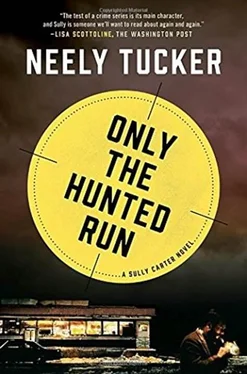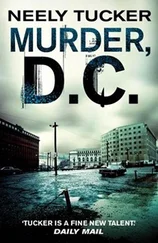He nodded, stealing a glance at the clock on the wall behind her before she could. Twenty till five.
“Ma’am,” he said, “not to hurry you any at all, but could you tell me the name of the funeral home in town?”
***
“You’re asking a mean thing,” Mr. Larrington was saying, looking down at Sully’s business card, the air in the room as dead as the clientele.
“Yes, sir, I know it.”
“But what on Earth for? A reporter from a fancy newspaper in D.C. shows up just before closing time, asking about a client we had nearly thirty years ago. This doesn’t happen a lot out here… Mr. Carter.” He said this, looking down at the card in his hand.
“I suppose not.” Sully, wearing down some now, fighting to keep the momentum, his eyes adjusting from the glare outside to the gloom here. The amber lighting in the office was professional, he realized, not happenstance. The darkest day in January, the brightest July afternoon, a client would be comforted by the dim yellow air falling over their skin, not casting too harsh a glare on their grief-ravaged faces. If they wept, there were tissues and shadows. The management of grief. You were Mr. Larrington, you needed to manage that grief into the $6,345 Eternal Comfort package, versus the velvet-lined $3,995 Peaceful Slumbers. It made Sully wonder, briefly, what his father had chosen for his mother. Or, for that matter, what his aunt had chosen for his father. Nadia, there weren’t options. They were burying people in modified bookcases in Sarajevo by then.
“I came out here on this Waters thing, like everybody else,” he said. Mr. Larrington, the man with the fleshy jowls and the kind face, looking back across the walnut desk at him. Not a single paper on the desk. Nothing but full attention for the client. “And then I came across this, this family tragedy. It’s just a feature story, about the county, when Terry Waters was growing up out here. The places that form people, that sort of thing. I wonder if George, the Harpers’ boy, knew Terry.”
Mr. Larrington cleared his throat and tapped Sully’s card on the well-carved edge of the desk. Sully had the idea Mr. Larrington cleared his throat every time before he spoke to clients in this room, to make sure he had just the right baritone edge.
“I wouldn’t know, of course. I was in my early thirties then. My father, he was aging out of the business. Things were quite busy. You wouldn’t think it, coming from where you do, but they were. We don’t rush things out this way, particularly the passing of loved ones.” He paused, to give the observation the proper gravitas. “But of course I remember the day they brought Mrs. Harper in. No one would forget that. I remember Sheriff had to put a new backseat in the patrol car. There just wasn’t nothing else for it.”
“The boy, with her that day. Helluva thing.” Stealing the deputy’s line.
“Of course. I remember the day, but little of him. This is a funeral home, not a hospital. He was a sprite of a thing. Sat with his grandfather the next morning when arrangements were made. My father, he was handling the transaction, but wanted me to witness it, to learn how to handle death in trauma.”
“The boy’s mother didn’t come to fetch him? His father?”
“I have no idea. But not by the next day, apparently. The father, I remember being told, was not in the picture, and the mother wasn’t available.”
Sully looked up from his notebook, and Mr. Larrington was already holding up a hand. “I don’t know what ‘not available’ means, either. The mother, she was the Harpers’ daughter. For all I know, she was on vacation in Niagara Falls. Or in a dry-out tank in Los Angeles. Families in grief are odd things. It’s not our business to question.”
“Of course.”
“The boy, carrying her name, and not the father’s, suggested they were never married.”
“Of course.”
“Still, it was odd. The grandfather and the little boy, selecting a burial package for a wife, grandmother, and a suicide. The overwhelming impression I have of the time, however, is not the boy, but the grandfather. Mr. Harper. Sternest, most humorless man you’d want to meet. Does it carry weight that an undertaker says a man is humorless, void of feelings, possessed of a robotic presence? Yes or no, well then. I see many a decent people at their worst, penny-pinching moment in life-‘Do I spend the extra three thousand for mother’s coffin that no one will ever see, or do I take the wife to Hawaii for a week?’-and Mr. Harper was not a decent person.”
“I see.”
“He said he worked outside, on rigs and in the fields, but was pale as a ghost. Denim jeans, denim jacket. Looked like he had donated two quarts of blood and had a hangover besides. Touched the brim of his hat to my father. Didn’t speak to the boy at all, who sat there on the floor, back against the wall, as his grandfather sought to spend the least amount of money possible to put his beloved wife in the eternal dirt.”
Sully shifted in his seat. “So, not a lot of negotiations there.”
Mr. Larrington bristled. “I would say not. It’s not that we negotiate. He kept asking about the most economical thing we had, and my father, he really couldn’t believe it, that this man would so dishonor his wife this way. So my father kept asking, ‘Economical how?’ as if he understood Mr. Harper to be talking about a minimalist casket, something about the design, until Mr. Harper grew impatient and said, ‘I mean the cheapest.’ Which is pretty much a pine box. There’s lots of poor people around here and there’s a lot of people who have little in the way of book learning and there isn’t any reason to pretend there isn’t. But Mr. Harper wasn’t either of the two. Pardon my French, but it was just a sorry goddamn thing to witness. Mr. Harper, he arranged to have his wife buried in the city cemetery and did not stay for the services.”
Sully, scribbling in his notebook, the pen scratching the page, stopped and looked up to see Mr. Larrington looking at him. “He didn’t attend his own wife’s funeral?”
Mr. Larrington shook his head, pleased his point had been received. “Paid cash money for the site, picked out the granite. Just a flat dash marker.”
“I’m sorry. A ‘dash marker’?”
“Yes. The year of birth, year of death, and the dash in between. Your entire life, distilled to a horizontal blip between eight numbers.”
“Ah.”
“He didn’t so much as spring for ‘beloved.’”
“Well, that’s just common.”
“He picked out a spot in the cemetery and told us to do it at the first opportunity. Gave my father half up front and said he’d send us the rest when we sent him a picture. And he stood up, put his hat back on, touched the brim again to my father, and was gone, with the boy in the truck.”
The words floated out in the room like one of the eulogies spoken in the adjacent chapel, the final summing up, the last echo fading away.
“Did you ever see him, the boy, again?”
“No. There was no funeral. The interment was just me and the pastor. The grounds staff was a few yards off, leaning on shovels, waiting for us to finish up.”
“Hunh.” Sully was back to writing in his notebook, more to give himself time to think than to record every word, and, without looking up, said, “Did Mr. Harper pay the rest? And any chance you might still have that address where you mailed the picture?”
Mr. Larrington shook his head, no, no. “It was a quiet scandal. No one really knew them. My father, he didn’t even mail the photograph to trigger the second payment. The insult he had been given, that we could not be trusted without photographic evidence. Outrageous. No, she was interred and that was all. Much more known in death than in life. My missus, she didn’t even know Mrs. Harper’s first name until she read in the obituary in the newspaper.”
Читать дальше








![Джон Макдональд - The Hunted [Short Story]](/books/433679/dzhon-makdonald-the-hunted-short-story-thumb.webp)



